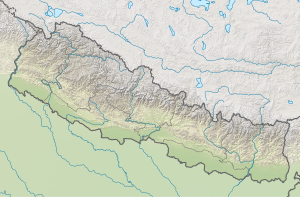Gurbhakot
This article needs additional citations for verification. (March 2017) |
Gurbhakot
गुर्भाकोट नगरपालिका | |
|---|---|
| Coordinates: 28°26′21″N 81°51′10″E / 28.439042°N 81.852828°E | |
| Country | |
| Province | Karnali |
| District | Surkhet |
| Total Wards | 14 |
| Established | 1 October 2015 |
| Established as | Shubhaghat Gangamala |
| Government | |
| • Mayor | Mr. Hasta Pun (NC) |
| • Deputy Mayor | Mrs. Maina BK (NC) |
| Area of Municipality | |
• Total | 228.62 km2 (88.27 sq mi) |
| Population (2011) | |
• Total | 43,765 |
| Languages | |
| • Official | Nepali |
| Time zone | UTC+5:45 (NST) |
| Website | official website |
Gurbhakot (Nepali: गुर्भाकोट) is an urban municipality located in Surkhet District of Karnali province of Nepal.
According to 2011 Nepal census the total population of the municipality is 43,765 and the total area of the municipality is 228.62 square kilometres (88.27 sq mi). The municipality is divided into total 14 wards. Malarani, Dharapani and Sahare VDC were Incorporated with Subhaghat Gangamala municipality in 2017 when government cancelled all old administration system and introduce new 753 local level administrative body.[1]
The municipality is surrounded by Salyan in east, Bheriganga in west, Simta and Chingad in north and Salyan in south.[2]
History
[edit]Subhaghat Gangamala municipality was established on 1 December 2015 merging 4 VDC Dahachaur, Ghumkhahare, Gumi and Mehelkuna.
In 2017 when new administrative system applied Malarani, Dharapani and Sahare incorporated with Subhaghat Gangamala municipality and renamed as Gurbhakot municipality.[3][4]
Demographics
[edit]At the time of the 2011 Nepal census, Gurbhakot Municipality had a population of 44,359. Of these, 95.5% spoke Nepali, 4.3% Magar, 0.1% Maithili and 0.1% other languages as their first language.[5]
In terms of ethnicity/caste, 29.2% were Chhetri, 26.9% Kami, 26.2% Magar, 5.0% Hill Brahmin, 3.4% Damai/Dholi, 2.8% Thakuri, 2.2% Gurung, 1.8% Sarki, 0.8% Sanyasi/Dasnami, 0.7% Badi, 0.2% Gaine, 0.2% Newar, 0.1% Bote, 0.1% Majhi, 0.1% Musalman, 0.1% Raji, 0.1% Tharu, 0.1% Yadav and 0.1% others.[6]
In terms of religion, 96.1% were Hindu, 2.5% Christian, 1.1% Buddhist, 0.1% Muslim and 0.1% others.[7]
In terms of literacy, 71.6% could read and write, 3.0% could only read and 25.3% could neither read nor write.[8]
References
[edit]- ^ "स्थानीय तहहरुको विवरण". www.mofaga.gov.np. Ministry of Federal Affairs and General Administration (Nepal). Archived from the original on 31 August 2018. Retrieved 12 July 2018.
- ^ "District Corrected Last for RAJAPATRA" (PDF). www.mofald.gov.np. Retrieved 12 July 2018.
- ^ "26 new Municipalities announced". infonepal.net. Archived from the original on 2015-10-05.
- ^ "गुर्भाकोट नगरपालिकाको वेवसाइटमा तपाईहरुलाई स्वागत छ।". www.gurbhakotmun.gov.np. Retrieved 15 July 2018.
- ^ NepalMap Language [1]
- ^ NepalMap Caste [2]
- ^ NepalMap Religion [3]
- ^ NepalMap Literacy [4]
External links
[edit]


